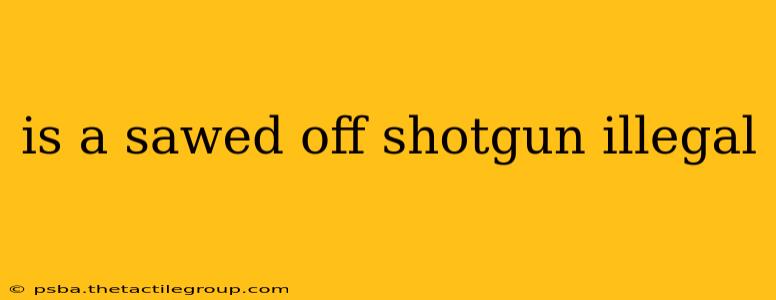The legality of a sawed-off shotgun is a complex issue, varying significantly depending on your location and the specific modifications made to the firearm. Simply put, in most jurisdictions, possessing a sawed-off shotgun without the proper licensing and registration is illegal. This is due to the inherent dangers and increased lethality associated with these modified weapons. This guide will delve into the specifics of federal and state laws to provide a clearer understanding.
Federal Regulations: The National Firearms Act (NFA)
The cornerstone of federal regulations regarding sawed-off shotguns is the National Firearms Act (NFA) of 1934. This act classifies short-barreled shotguns (SBS) and short-barreled rifles (SBR) as "firearms" subject to strict registration and taxation. The NFA defines an SBS as a shotgun with a barrel less than 18 inches in length, or a firearm made from a shotgun that has an overall length of less than 26 inches.
Key Implications of the NFA:
- Registration: Possession of an SBS requires registration with the Bureau of Alcohol, Tobacco, Firearms and Explosives (ATF). This involves a thorough background check and significant paperwork.
- Tax Stamp: A substantial tax is levied on the registration of NFA firearms, including SBS.
- Penalties for Non-Compliance: Failure to register or possess an unregistered SBS carries severe penalties, including substantial fines and imprisonment.
It's crucial to understand that simply shortening a shotgun barrel does not automatically make it legal. The act of modifying a shotgun to meet the definition of an SBS, without following the proper NFA procedures, is illegal.
State Laws: Variations and Additional Restrictions
While federal law provides a baseline, individual states may impose additional restrictions or regulations on sawed-off shotguns. Some states might have stricter length requirements, harsher penalties for unlawful possession, or outright bans on certain types of firearms, including SBS. It's imperative to research the specific laws of your state before handling or possessing any firearm that could be considered an SBS.
To determine the specific regulations in your area, you should consult your state's legal code or contact your state's attorney general's office.
Exemptions and Exceptions (Rare Cases)
There are extremely limited exceptions to the NFA's regulations on SBS, primarily for law enforcement and certain collectors under specific circumstances. These exceptions are highly regulated and require meticulous adherence to strict procedures and documentation. The average citizen should not expect to qualify for any of these exceptions.
Understanding the Risks: Why the Restrictions Exist
The restrictions surrounding sawed-off shotguns are not arbitrary. These weapons are significantly more dangerous due to:
- Increased Recoil: The shorter barrel leads to increased recoil, making them harder to control and increasing the risk of injury to the shooter.
- Greater Maneuverability: Their compact size allows for easier concealment and maneuverability in close-quarters situations.
- Increased Lethality: While not inherently more powerful, the shorter barrel can lead to a tighter shot pattern at close range, increasing the likelihood of hitting the target.
These factors contribute to the heightened risks associated with sawed-off shotguns, justifying the strict regulations aimed at limiting their availability and misuse.
Conclusion: Know the Law Before You Act
The legality of a sawed-off shotgun hinges on a complex interplay of federal and state laws. It's critical to understand that modifying a shotgun to create an SBS without adhering to the NFA's requirements is a serious offense with potentially severe consequences. Always prioritize legal compliance and safety when handling firearms. Consult with legal professionals and your local law enforcement agencies to ensure complete understanding and adherence to all applicable laws. This information is for educational purposes only and should not be considered legal advice.

